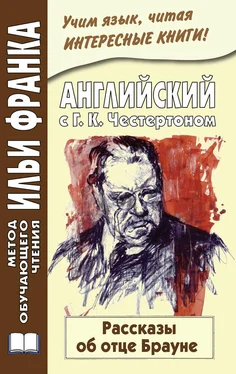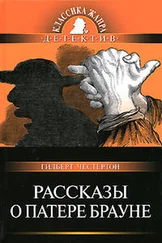Flambeau knit his black brows(Фламбо нахмурил черные брови; to knit – вязать; хмурить /брови/ ) . “I don’t grasp it all yet(я все еще не понимаю) ,” he said.

 “But what about Olivier and the hanging?” asked Flambeau.
“But what about Olivier and the hanging?” asked Flambeau.
“Olivier, partly from chivalry, partly from policy, seldom encumbered his march with captives,” explained the narrator. “He released everybody in most cases. He released everybody in this case.
“Everybody but the general,” said the tall man.
“Everybody,” said the priest.
Flambeau knit his black brows. “I don’t grasp it all yet,” he said.
“There is another picture, Flambeau(вот еще одна картина, Фламбо) ,” said Brown in his more mystical undertone(сказал отец Браун еще более таинственным приглушенным голосом; undertone – приглушенный голос ) . “I can’t prove it; but I can do more – I can see it(я не могу доказать, но важнее то, что я вижу ее) . There is a camp breaking up on the bare, torrid hills at morning(вот лагерь, который собирается утром покинуть выжженные солнцем холмы; to break up – прекращать, заканчивать; torrid – жаркий, знойный, выжженный солнцем ) , and Brazilian uniforms massed in blocks and columns to march(и бразильцы в форменной военной одежде, построенные в многочисленные группы и колонны для марш-броска; to march – маршировать; двигаться колонной; выступать в походном порядке ) . There is the red shirt and long black beard of Olivier, which blows as he stands, his broad-brimmed hat in his hand(вот красная рубаха Оливье и его длинная черная борода, которая развевается на ветру, в то время как он стоит с широкополой шляпой в руке; to blow – дуть; brim – край; поля /шляпы/ ) . He is saying farewell to the great enemy he is setting free(он прощается с достойным противником, которого он отпускает на свободу; to say farewell – прощаться ) – the simple, snow-headed English veteran, who thanks him in the name of his men(простым английским ветераном с белой, как снег, головой, который благодарит его от имени своих солдат) . The English remnant stand behind at attention(оставшиеся в живых англичане стоят по команде смирно позади /генерала/; remnant – остаток; оставшиеся в живых, выжившие; to stand at attention – стоять по команде смирно ) ; beside them are stores and vehicles for the retreat(рядом с ними запасы провианта и повозки для отступления; retreat – отступление ) . The drums roll(бьют барабаны; to roll – катить/ся/; грохотать, громыхать ) ; the Brazilians are moving(бразильцы трогаются в путь) ; the English are still like statues(англичане /стоят/ как изваяния) . So they abide till the last hum and flash of the enemy have faded from the tropic horizon(они так и стоят, пока не стихает /последний/ шум и враг не скрывается из вида за тропическим горизонтом; to abide – ждать, ожидать /покорно или пассивно/; hum – жужжание; глухой, приглушенный шум; flash – внешний блеск; to fade – увядать; постепенно исчезать, расплываться, растворяться ) . Then they alter their postures all at once, like dead men coming to life(затем они сразу же меняют позы, как ожившие мертвецы) ; they turn their fifty faces upon the general – faces not to be forgotten(к генералу обращаются пятьдесят лиц – лиц, которые нельзя забыть; to forget ) .”

 “There is another picture, Flambeau,” said Brown in his more mystical undertone. “I can’t prove it; but I can do more – I can see it. There is a camp breaking up on the bare, torrid hills at morning, and Brazilian uniforms massed in blocks and columns to march. There is the red shirt and long black beard of Olivier, which blows as he stands, his broad-brimmed hat in his hand. He is saying farewell to the great enemy he is setting free – the simple, snow-headed English veteran, who thanks him in the name of his men. The English remnant stand behind at attention; beside them are stores and vehicles for the retreat. The drums roll; the Brazilians are moving; the English are still like statues. So they abide till the last hum and flash of the enemy have faded from the tropic horizon. Then they alter their postures all at once, like dead men coming to life; they turn their fifty faces upon the general – faces not to be forgotten.”
“There is another picture, Flambeau,” said Brown in his more mystical undertone. “I can’t prove it; but I can do more – I can see it. There is a camp breaking up on the bare, torrid hills at morning, and Brazilian uniforms massed in blocks and columns to march. There is the red shirt and long black beard of Olivier, which blows as he stands, his broad-brimmed hat in his hand. He is saying farewell to the great enemy he is setting free – the simple, snow-headed English veteran, who thanks him in the name of his men. The English remnant stand behind at attention; beside them are stores and vehicles for the retreat. The drums roll; the Brazilians are moving; the English are still like statues. So they abide till the last hum and flash of the enemy have faded from the tropic horizon. Then they alter their postures all at once, like dead men coming to life; they turn their fifty faces upon the general – faces not to be forgotten.”
Flambeau gave a great jump(Фламбо подскочил) . “Ah,” he cried, “you don’t mean(неужели вы хотите сказать) – ”
“Yes,” said Father Brown in a deep, moving voice(сказал отец Браун глубоким взволнованным голосом) . “It was an English hand that put the rope round St. Clare’s neck(это была рука англичанина, которая накинула петлю на шею Сент-Клэра) ; I believe the hand that put the ring on his daughter’s finger(я полагаю, это та рука, которая надела кольцо на палец его дочери) . They were English hands that dragged him up to the tree of shame(это были руки англичан, которые тащили его к дереву позора; to drag – тянуть, тащить; shame – стыд; позор; бесчестие ) ; the hands of men that had adored him and followed him to victory(руки людей, которые почитали его и шли за ним к победе; to adore – обожать; поклоняться, почитать, преклоняться ) . And they were English souls (God pardon and endure us all!) who stared at him swinging in that foreign sun on the green gallows of palm(и это были англичане: «сердца англичан» (да простит и укрепит нас Господь!), которые смотрели, как генерал качался в лучах чужеземного солнца на зеленой пальме-виселице; soul – душа; сердце; to pardon – извинять, прощать; миловать; to endure – вынести, вытерпеть; выдержать; to swing – качать/ся/, раскачивать/ся/; gallows – виселица ) , and prayed in their hatred that he might drop off it into hell(и молились, полные ненависти, чтобы его душа попала в ад: «он провалился прямо в ад»; to drop – капать; бросать; сбрасывать; падать ) .”
Читать дальше
Конец ознакомительного отрывка
Купить книгу


 “But what about Olivier and the hanging?” asked Flambeau.
“But what about Olivier and the hanging?” asked Flambeau.




